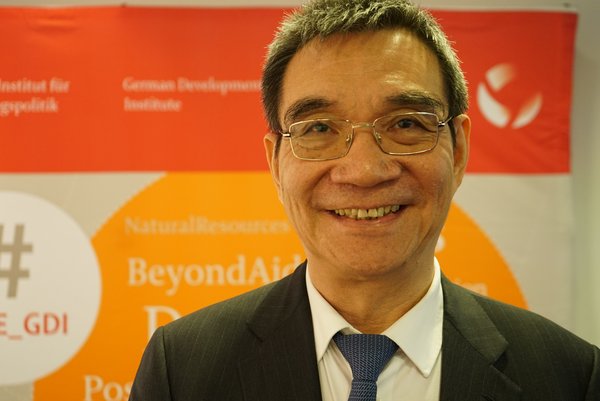- Share this article
- Subscribe to our newsletter
Jumpstarting economies in developing countries
Throughout the world, several countries are still trapped in a middle- or low-income situation, having failed to enter a process of continued structural transformation, maintains former World Bank Chief Economist Justin Yifu Lin. According to Lin, successful post-war economies all feature openness, macrostability and high rates of saving and investment. And they are all market economies with what he refers to as credible and capable governments. Nevertheless, as Lin, Dean of the Institute for New Structural Economics at China’ Peking University, these characteristics are just ingredients for good growth rates. So what is the recipe for economic success stories?
Presenting his two new books “Going Beyond Aid” and “Beating the Odds” at the Bonn-based German Development Institute / Deutsches Institut für Entwicklungspolitik (DIE) in January 2019, Lin argued that traditional development aid was inadequate to support structural transformation and that developing countries had the opportunity to achieve rapid economic growth by leaping directly into the global economy, also with their agricultural and services sectors. Referring to developments since the Second World War, Lin noted that only 30 countries had made it to the high-income level, among them eight in Europe, and including Japan, Korea, Taiwan, Hong Kong and Singapore. The vast majority of developing countries had remained at low-income level, despite investment, international development institutions, loans and other support.
Making use of comparative advantages
Lin put the failure of efforts down to “inadequate development ideas”, referring first of all to the import substitution strategy and the white elephants it had as an outcome. The Washington Consensus was prescribed in turn by the International Monetary Fund, the World Bank and the United States Department of the Treasury, among others, to bring developing countries in crisis back on track through structural adjustment and a stronger orientation on trade liberalisation, based on the assumption that government failures had been responsible for lack of progress. Meanwhile, the Asian Tigers, having opted for export promotion, bypassed both of the major international strategies, pursuing a course of moving towards the market while establishing effective governance, an approach also adopted by transition economies like Vietnam, Mauritius and China.
New Structural Economics identifies determinants of economic structure and its evolution, centring on factor endowment – the means of production, such as land, labour and capital – as a key aspect. Greater factor endowment results in greater economic success and hence a higher Gross Domestic Product and more economic growth. Comparative advantages of regions arise from differences between them in terms of their factor endowments. Structuralism, Lin argues, had failed to follow comparative advantages, while the Washington Consensus had brought about strategies defying them – in contrast to the East Asian economies, which had focused precisely on these advantages. He points out that while lacking capital, developing countries dispose of raw materials and labour. Here, growth depends on developing and upgrading industrial structures and requires both a competitive market and a facilitating state.
Jumpstarting successes
Lin believes that South-South development co-operation is more effective than North-South development co-operation because it combines aid with trade and private-sector investment. He suggests that the concept of development co-operation be redefined to incorporate official development assistance (ODA), other investment flows and transactions by the official sector (OOFs) as well as private sector investment. He also sees good prospects for many developing countries to jumpstart their labour-intensive economies now that wages are rising in China and it is opting for more capital-intensive industries. This would apply in particular to Africa, where industrial parks in Senegal and Ethiopia as well as a Special Economic Zone in Rwanda are already receiving Chinese support. But does jump-starting really also hold benefits for the agricultural sector?
Vietnam opted for an open, market-oriented system for its agricultural sector in the mid-1980s. Its new approach centred on land and trade reform as well as policy instruments to assist the agricultural sector as a whole. Since then, Vietnam, which used to be a country threatened by hunger, has turned into a major food exporter.
Not a panacea
Mauritius, meanwhile, has become a middle-income country and ranks third in Africa in the United Nations Human Development Index. Its chief crop, sugarcane, has declined in significance compared to the country’s manufacturing and tourist industries. Other major agricultural produce includes tea and tobacco, although the sector’s overall contribution to GDP has dropped to well below five per cent.
Mauritius relies on imports for 70 per cent of its food requirements, making it highly vulnerable to global food price fluctuations. Furthermore, it is exposed to a number of hazards related to climate change, while its fishing industry suffers heavily from the depletion of marine resources. Its once extensive tropical forest cover has been reduced to a mere two per cent of its overall area.
To safeguard food supply, Mauritius’ Ministry of Agro-Industry and Food Security has formulated a range of measures designed to address food production and consumption. Mauritians are called on to eat more local produce and take up kitchen gardening. Furthermore, the government is co-operating with other countries in the region in a bid to find opportunities to grow food crops and invest in African mainland agricultural areas. Here, regional co-operation could provide an answer to some of the problems Mauritius faces that jumpstarting the economy seems to have failed to solve.
Mike Gardner, journalist, Bonn/Germany





Add a comment
Be the First to Comment